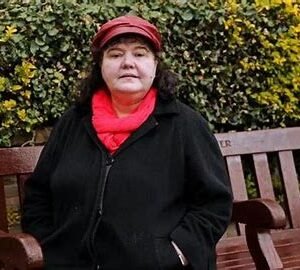Netflix’s dark comedy “Baby Reindeer” has captivated audiences with its portrayal of a comedian’s harrowing experience with a stalker. The show, written by and starring Richard Gadd, claims to be a true story, but the identity of the stalker, “Martha,” has been shrouded in mystery. This has led to a whirlwind of speculation and questions online, particularly about the woman who may have inspired the character.

Is There a Real-Life Martha?
While the show emphasizes being a true story, the answer is complex. Richard Gadd has always maintained that certain details were changed to protect the real person’s identity. However, a Scottish lawyer named Fiona Harvey came forward in June 2024, claiming to be the inspiration for Martha. She vehemently denied the show’s portrayal and sued Netflix for $170 million, alleging defamation and emotional distress.
Gadd, on the other hand, has never confirmed Harvey’s claims. He insists that “Baby Reindeer” captures the emotional truth of his experience, not a factual retelling. This has left viewers wondering: is there a real-life Martha, and if so, how much of the show reflects reality?
Unveiling Fiona Harvey’s Claims: A Different Narrative
Harvey’s story directly contradicts the show’s depiction. She claims to have met Gadd at a comedy club in 2010 and developed a platonic friendship. They exchanged emails for a while, but Harvey insists it was never obsessive harassment. She denies ever stalking him or interfering with his personal life.
Harvey’s lawsuit hinges on the idea that the show has damaged her reputation. She points out discrepancies between her life and the show’s portrayal. For example, the show depicts Martha as an older woman who doesn’t drink alcohol, whereas Harvey clarifies that she’s younger and does drink occasionally. These details, while seemingly minor, highlight the potential for viewers to form a negative perception based on a fictionalized version of events.
The lawsuit is still ongoing, and it remains to be seen if Harvey’s claims hold weight. However, her perspective sheds light on the complexities of portraying real-life experiences in fiction.
The Show’s Defense: Capturing the Emotional Toll
Gadd, through Netflix, has defended the show’s artistic license. They argue that “Baby Reindeer” is not a documentary but a dramatization of his experience. The core message, they claim, is about the emotional and psychological impact of being stalked, not a factual account of every detail.
Gadd has emphasized that he took great pains to disguise the real person’s identity. He changed aspects of Martha’s character and the timeline of events to ensure her anonymity. Their point is that the emotional truth of feeling unsafe and harassed transcends specific details.
This defense raises questions about the responsibility of dramatizing real-life events. While artistic freedom exists, blurring the lines between reality and fiction can have consequences, as seen in Harvey’s case.
Beyond the Legal Battle: The Broader Conversation
The “Baby Reindeer” controversy has sparked a larger conversation about the portrayal of stalkers and victims in media. Mental health experts have pointed out the show’s potential to generate empathy for the psychological state of stalkers, which can be problematic.
On the other hand, the show has also brought to light the often-silenced experiences of victims. Stalkers can be manipulative and calculating, making it difficult for victims to be taken seriously. “Baby Reindeer” has opened a dialogue about the emotional toll of stalking and the need for better support systems for victims.
The Unanswered Questions: Where Do We Go From Here?
The “Baby Reindeer” saga leaves several questions unanswered. Will the lawsuit be successful? How will the controversy impact the show’s legacy? Most importantly, can we learn from this case to create art that is both truthful and sensitive to the impact on real people?
Whether Fiona Harvey is the real Martha or not, the show has undeniably sparked important discussions. It highlights the line between artistic freedom and the potential for causing harm. Hopefully, the conversation will lead to a better understanding of stalking and a commitment to creating narratives that empower victims without sensationalizing the actions of perpetrators.

FAQ’S
Q: Was Martha in “Baby Reindeer” a real person?
A: The show claims to be based on a true story, but the details are murky. While comedian Richard Gadd, who plays himself in the show, has acknowledged a real-life experience with a stalker, her identity remains a mystery.
Q: So, who is the “real” Martha?
A: A woman named Fiona Harvey claims to be the inspiration for the character. She has sued Netflix for defamation, alleging the show portrays her unfairly. However, Gadd has vehemently denied this, stating he has disguised the real person’s identity to protect them.
Q: What are the arguments for and against Fiona Harvey being Martha?
A: Harvey points to some similarities between her life and the show. She reportedly once compared Gadd to a “baby reindeer” toy, which aligns with the show’s title. However, Gadd maintains this was a minor detail and has changed many aspects of the story to obscure the real person’s identity.
Q: Did Richard Gadd really get stalked?
A: Gadd has confirmed experiencing a four-year period of harassment from a woman, involving emails, voicemails, and unwanted visits. However, the extent and details remain unclear.
Q: Why is the “real” Martha’s identity a secret?
A: Gadd claims extensive efforts were made to protect the real person’s privacy. He argues the show captures the emotional truth of the situation, not a play-by-play account.
Q: What are the ethical concerns surrounding the show?
A: Some critics argue that portraying a potentially mentally ill person in such a negative light is insensitive. There’s also the question of how much creative license can be taken when claiming a story is true.
Q: Where can I find more information about the “real” Martha?
A: Unfortunately, credible details about the real person are scarce due to the deliberate obfuscation by Gadd and the ongoing legal case.
Q: Does the controversy affect how we should view “Baby Reindeer”?
A: That’s up to you. The show’s dark humor and exploration of obsession remain compelling, but the true story question adds another layer for viewers to consider.
Q: What are some resources for people dealing with stalking?
A: If you or someone you know is experiencing stalking, here are some resources:
* National Stalking Victim Resource Center
* National Center for Victims of Crime.
To read more, Click here





